Related Research Articles

The United Kingdom is a constitutional monarchy which, by legislation and convention, operates as a unitary parliamentary democracy. A hereditary monarch, currently King Charles III, serves as head of state while the Prime Minister of the United Kingdom, currently Sir Keir Starmer since 2024, serves as the elected head of government.
The Conservative and Unionist Party, commonly the Conservative Party and colloquially known as the Tories, is one of the two main political parties in the United Kingdom, along with the Labour Party. It has been the Official Opposition since being defeated in the 2024 general election. The party sits on the right-wing to centre-right of the political spectrum. It encompasses various ideological factions including one-nation conservatives, Thatcherites, and traditionalist conservatives. There have been twenty Conservative prime ministers.

Alexander Boris de Pfeffel Johnson is a British politician and writer who served as Prime Minister of the United Kingdom and Leader of the Conservative Party from 2019 to 2022. He was previously Foreign Secretary from 2016 to 2018 and Mayor of London from 2008 to 2016. He was Member of Parliament (MP) for Henley from 2001 to 2008 and Uxbridge and South Ruislip from 2015 to 2023.

Sir Julian Richard Smith, is a British Conservative Party politician who has been the Member of Parliament (MP) for Skipton and Ripon since 2010. He served as Government Chief Whip from 2017 to 2019 and Secretary of State for Northern Ireland from 2019 to 2020.
The 2017 Progressive Conservative Association of Alberta leadership election was held on March 18, 2017, in Calgary. It chose Jason Kenney as the successor to former Alberta Premier and Progressive Conservative Association of Alberta leader Jim Prentice. He resigned after the party was defeated in the May 5, 2015 general election. The party had governed the province for 44 consecutive years. Prentice had been elected leader eight months prior to his defeat.

The 2019 United Kingdom general election was held on Thursday, 12 December 2019, with 47,567,752 registered voters entitled to vote to elect 650 Members of Parliament (MPs) to the House of Commons. The governing Conservative Party led by the prime minister, Boris Johnson, won a landslide victory with a majority of 80 seats, a net gain of 48, on 43.6 per cent of the popular vote, the highest percentage for any party since the 1979 general election, though with a narrower popular vote margin than that achieved by the Labour Party over the Conservatives at the 1997 general election. This was the second national election to be held in 2019 in the United Kingdom, the first being the 2019 European Parliament election.
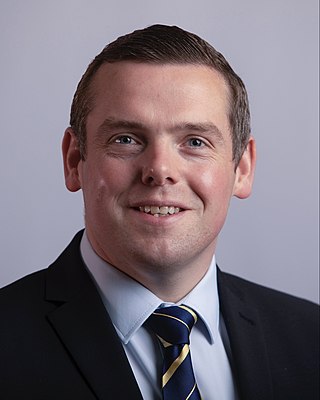
Douglas Gordon Ross is a Scottish politician who has served as Leader of the Scottish Conservative Party since 2020 and Leader of the Opposition in Scotland since 2021. He served as Member of the UK Parliament (MP) for Moray from 2017 to 2024. Ross currently serves as a Member of the Scottish Parliament (MSP) for the Highlands and Islands, having been elected as a regional list MSP in 2021. He was previously MSP for the region from 2016 to 2017.

The United Conservative Party of Alberta (UCP) is a conservative political party in the province of Alberta, Canada. It was established in July 2017 as a merger between the Progressive Conservative Association of Alberta and the Wildrose Party. When established, the UCP immediately formed the Official Opposition in the Legislative Assembly of Alberta. The UCP won a majority mandate in the 2019 Alberta general election to form the government of Alberta. The party won a renewed majority mandate in the 2023 Alberta general election under the leadership of Danielle Smith.

The 2019 Conservative Party leadership election was triggered when Theresa May announced on 24 May 2019 that she would resign as leader of the Conservative Party on 7 June and as Prime Minister of the United Kingdom once a successor had been elected. Nominations opened on 10 June; 10 candidates were nominated. The first ballot of members of Parliament (MPs) took place on 13 June, with exhaustive ballots of MPs also taking place on 18, 19 and 20 June, reducing the candidates to two. The general membership of the party elected the leader by postal ballot; the result was announced on 23 July, with Boris Johnson being elected with almost twice as many votes as his opponent Jeremy Hunt.
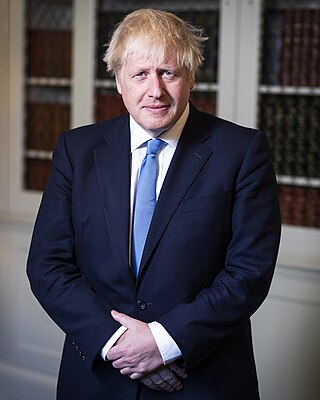
Boris Johnson's tenure as prime minister of the United Kingdom began on 24 July 2019 when he accepted an invitation of Queen Elizabeth II to form a government, succeeding Theresa May, and ended on 6 September 2022 upon his resignation. Johnson's premiership was dominated by Brexit, the COVID-19 pandemic, the Russian invasion of Ukraine, and the cost of living crisis. As prime minister, Johnson also served simultaneously as First Lord of the Treasury, Minister for the Civil Service, Minister for the Union and Leader of the Conservative Party.

Caroline Louise Beavan Johnson is an English media consultant and is married to Boris Johnson. She is the daughter of Matthew Symonds, co-founder of The Independent.
2010s political history refers to significant political and societal historical events in the United Kingdom in the 2010s, presented as a historical overview in narrative format.

The second Johnson ministry began on 16 December 2019, three days after Boris Johnson's audience with Queen Elizabeth II where she invited him to form a government following the 2019 general election. The Conservative Party was returned to power with a majority of 80 seats in the House of Commons. Initially the ministers were largely identical to those at the end of the first Johnson ministry, but changed significantly in cabinet reshuffles in February 2020 and September 2021.
2020s political history refers to significant political and societal historical events in the United Kingdom in the 2020s, presented as a historical overview in narrative format.
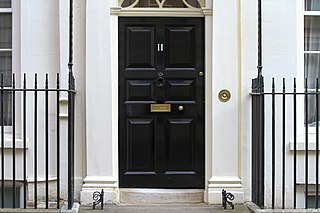
The financing of the 2020 refurbishment of the flat above 11 Downing Street, the official residence of the British Chancellor of the Exchequer, became the subject of a controversy in 2021 when allegations were made in the press as to whether an undisclosed loan was used initially to help finance it. An Electoral Commission inquiry found that the Conservative Party had not accurately reported donations to the party and imposed a £17,800 fine on the party. The commission also said that the full cost of the works had been repaid in full in March 2021. The Conservative Party had said at the time that the Prime Minister had met the full cost of the works.

Melissa Lantsman is a Canadian politician and public relations executive who serves as the member of Parliament (MP) for Thornhill since 2021. A member of the Conservative Party, she is the party's co-deputy leader and the co-deputy leader of the Official Opposition, serving with Tim Uppal. Lantsman is the first openly gay and first Jewish woman ever elected as a Conservative MP. Upon Pierre Poilievre's election as Conservative Leader, he named Lantsman one of two deputy leaders along with Uppal.

Partygate was a political scandal in the United Kingdom about gatherings of government and Conservative Party staff during the COVID-19 pandemic in 2020 and 2021, when public health restrictions prohibited most gatherings. The scandal contributed to Boris Johnson's downfall as Prime Minister and his resignation as an MP.
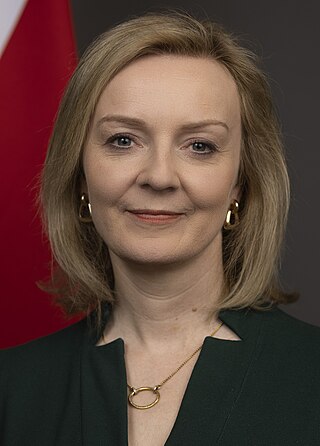
The July–September 2022 Conservative Party leadership election was triggered by Boris Johnson's announcement on 7 July 2022 that he would resign as Leader of the Conservative Party and Prime Minister of the United Kingdom, following a series of political controversies.
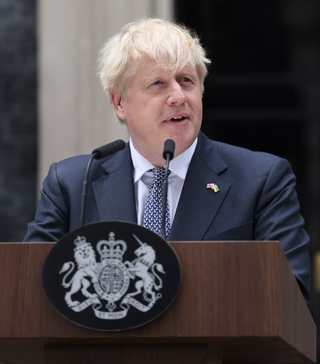
In early July 2022, 62 of the United Kingdom's 179 government ministers, parliamentary private secretaries, trade envoys, and party vice-chairmen resigned from their positions in the second administration formed by Boris Johnson as Prime Minister, culminating in Johnson's resignation on 7 July. Johnson's premiership had been considered in danger for months after several scandals, but it was the Chris Pincher scandal that was identified to have spurred on the resignations. Considered the "last straw" for the Prime Minister, the scandal arose after it was revealed that Johnson had promoted his Deputy Chief Government Whip Chris Pincher, who was publicly facing multiple allegations of sexual assault, to the position despite knowing of the allegations beforehand.

The October 2022 Conservative Party leadership election was triggered by Liz Truss's announcement that she would resign as Leader of the Conservative Party and Prime Minister of the United Kingdom, amid an economic and political crisis.
References
- ↑ "Battle for the centre: After Kenney's unite-the-right win, where will progressives go?". CBC. March 20, 2017. Retrieved 2 May 2017.
- ↑ "Boris Johnson's transition team poses a threat to British soft power". Irish Examiner. 2019-07-19. Retrieved 2021-03-19.
- ↑ "President Joe Biden's 'big problem' at the US border". BBC News. 2021-03-18. Retrieved 2021-03-19.
- ↑ "US election 2020: What is the presidential transition?". BBC News. 2020-11-24. Retrieved 2021-03-19.
- ↑ "Joe Biden hits the phones, calls European leaders". POLITICO. 2020-11-10. Retrieved 2021-03-19.